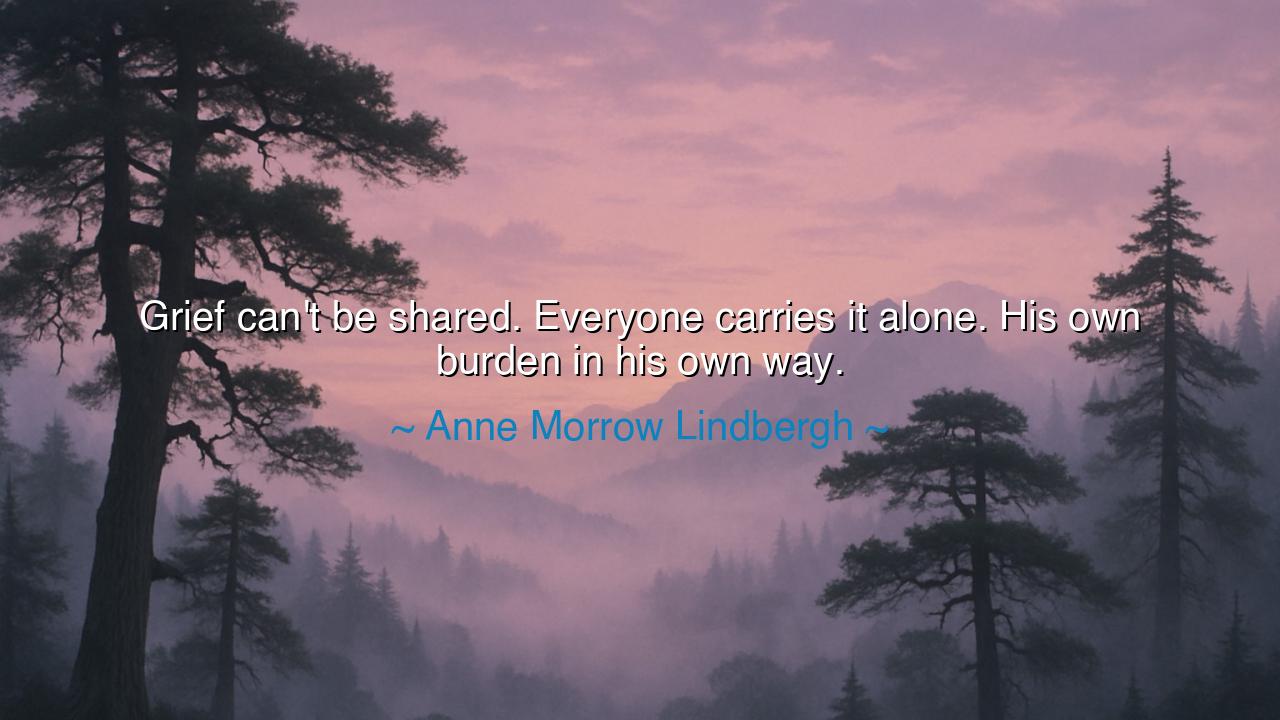
Grief can't be shared. Everyone carries it alone. His own burden






In the heart of human experience, there lies a truth that many have touched but few truly understand: grief is a burden that cannot be shared, not in the way we wish it could be. Anne Morrow Lindbergh, with her quiet wisdom, tells us: “Grief can't be shared. Everyone carries it alone. His own burden in his own way.” These words ring with the sorrow and solitude that accompany the deepest of losses. It is a reminder that while we may stand beside someone in their suffering, the true weight of grief is a personal journey, one that each soul must walk alone, no matter how many companions are at their side.
Grief, as Lindbergh so profoundly observes, is not something that can be divided between individuals, as we might share a burden of labor or joy. It is a silent and isolating force, one that enters the soul and bends it in ways words cannot fully express. The heartaches we carry are unique to us, shaped by our own experiences, memories, and the depth of our attachment to what has been lost. Just as no two lives are the same, no two experiences of grief can be alike. Each person carries their sorrow in their own way, often retreating inward, seeking solace in solitude, even as they long for connection.
Consider the ancient warrior Achilles, whose grief after the death of his close companion Patroclus consumed him utterly. Despite the presence of his comrades, Achilles withdrew into himself, his sorrow so overwhelming that it nearly led to his destruction. His grief was not something that could be soothed by the voices of those around him, nor by the praises of his deeds. The loss of his friend became a burden that shaped his every action, and in the silence of his soul, he carried it alone, a solitary figure in the vast sea of humanity. Even in the presence of others, Achilles' grief was his to bear, and he bore it in his own way, leading him to make choices that would ultimately seal his fate.
In more recent times, the story of Abraham Lincoln offers another poignant example. Upon the death of his beloved son Willie, Lincoln was plunged into a grief so deep that it affected not only his personal life but his presidency as well. While surrounded by advisors and family, Lincoln's sorrow was uniquely his, carried in the quietest of moments, in the hours when no one else could see the toll it took on him. Lincoln, despite being a figure of immense public strength, could not escape the private weight of his loss. In those dark hours, he learned, as Lindbergh’s words imply, that grief is a journey undertaken in solitude, no matter how much support one receives from the world around them.
Grief can never be fully understood by others because it is so deeply personal. It is a force that comes from within, shaped by our unique attachments to the people, places, and moments that define us. It cuts to the core of who we are, leaving scars that no one else can see or fully comprehend. This is the truth that Lindbergh’s words bring to light: we all carry grief alone, and each soul handles it differently. Some may retreat into silence, others may rage outward, and still others may seek solace in quiet reflection or in the arms of loved ones. But the grief we feel is ultimately something that belongs to us and us alone.
The lesson in Lindbergh's words is not one of despair, but of acceptance. It is a reminder that while we can offer our support to those who mourn, we must recognize that their sorrow is theirs to carry. It is not a burden that can be lifted by the well-intentioned words of others, nor by the actions of those who seek to soothe. Instead, we must create space for people to mourn in their own way, to find their own path to healing, and to understand that the journey of grief is one that unfolds over time, as unique as the individual who walks it.
In our own lives, let us not be afraid of grief. Instead, let us learn to bear it with grace and dignity, knowing that it is a part of our humanity. While we may walk alone in our sorrow, we are never truly isolated. Grief connects us to the world in ways we may not fully understand, for it reminds us of the fragility of life, the depth of love, and the strength of the human spirit. And when the time comes, as it always does, for healing to begin, we must honor the pace of others’ grief, allowing them the time they need to carry their burden in their own way.
Let us take action: when we encounter grief in others, let us not seek to remove it, but to offer understanding and compassion. Let us offer a shoulder to lean on, not to erase the sorrow, but to acknowledge it, to sit with it, and to honor it. In doing so, we become part of the healing process, offering what support we can while respecting the solitude that each person must experience on their own journey of grief. In this, we find not just empathy, but the strength of the human spirit, one that can withstand the deepest of sorrows and emerge, ultimately, more whole.






AAdministratorAdministrator
Welcome, honored guests. Please leave a comment, we will respond soon